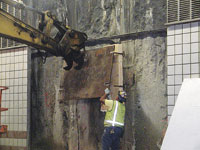 |
 |
| Tamed. Most defects in tunnel walls are minor but some will need steel plate wall. |
Managers on Bostons $14.6-billion Central Artery/Tunnel project are fixing pesky water problems in the $6.6-billion Interstate 93 tunnel. A thorough inspection of some 2,000 slurry wall panels uncovered 191 defects, which may cost contractors about $6 million to fix. Numerous roof joint and utility conduit leaks are also being tamed as the project nears completion.
The I-93 tunnel is basically a soldier pile/roof girder single wall structure constructed from 16 contracts involving eight contractors or joint ventures. It has 32,000 linear ft of slurry walls; each wall panel may contain two to five steel soldier piles. The 10-year-long project came under scrutiny after a wall panel blew out Sept. 15, 2004, flooding several lanes. All slurry wall panels underwent a nine-month, two-stage investigation. "Weve already paid for the walls and like any defect the contractor must make them good," says Michael P. Lewis, CA/T project director.
Of the 191 known defectsmostly inclusions and voidsonly two are classified as major. Both are located on the site of a contract held by Cambridge, Mass.-based Modern Continental Construction Co. Each will require a redundant steel plate wall to replace concrete lagging, for a total cost of about $500,000.
A forensic consultant recommended full panel replacement, which would have meant extensive dewatering (ENR 3/28 p. 10). But the Federal Highway Administration, CA/T, the joint venture program manager Bechtel/Parsons Brinckerhoff, and Modern opted for the plates. "Because of uncertainty over the source of the groundwater and the panels proximity to major structures, dewatering was considered a significant risk to workers and property owners," says Jack Wright, CA/T deputy project director.
Fifty defects found in eight different contracts are classified as moderate. They will require water blasting to purge the defective material, then placement of steel mesh and shotcrete finish. Some may also require a steel plate and whalers. The estimated repair cost is about $50,000 each. Repairs for the remaining 128 defects, found on 11 different contracts, are considered minor and estimated at $21,000 each. They will just need patching.
Eleven defects have not yet been classified and 19 defects have been repaired. FHWA senior area engineer John M. McVann says that 40 to 50 contractor plans have already been approved and more are arriving at the rate of several per week. Also under way is a roof-to-wall joint grouting program. Out of some 5,000 tunnel roof girders, about 1,510 locations need to be grouted. Some 100 utility sites also need plugging.
Project pump volumes dropped this year from a high of 1.8 gpm per 1,000 linear ft of tunnel to .5 gpm. Normal industry pump volumes range anywhere from .8 to 1.0 gpm.

Post a comment to this article
Report Abusive Comment